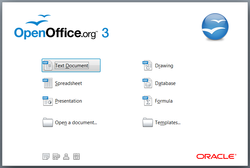
Back OpenOffice.org Afrikaans أوبن أوفيس.أورج Arabic OpenOffice.org AST OpenOffice.org Azerbaijani OpenOffice.org Byelorussian OpenOffice.org BE-X-OLD OpenOffice.org Bulgarian ওপেনঅফিস.অর্গ Bengali/Bangla OpenOffice.org BS OpenOffice.org Catalan
| OpenOffice.org | |
|---|---|
 | |
 The Start Center from OpenOffice.org v3.2.1 | |
| Original author(s) | Star Division (1985–1999) |
| Developer(s) | Sun Microsystems (1999–2009) Oracle Corporation (2010–2011) |
| Initial release | 1 May 2002[1] |
| Written in | C++[2] and Java |
| Operating system | Linux, OS X, Microsoft Windows, Solaris[3][4] |
| Platform | IA-32, x86-64, PowerPC, SPARC[3] |
| Predecessor | StarOffice |
| Successor | LibreOffice Apache OpenOffice |
| Standard(s) | OpenDocument |
| Available in | 121 languages[5] |
| Type | Office productivity suite |
| License | Dual-licensed under the SISSL and GNU LGPL (OpenOffice.org 2 Beta 2 and earlier)[6] GNU LGPL version 3 (OpenOffice.org 2 and later)[7] |
| Website | openoffice.org |
OpenOffice.org is a discontinued open-source office productivity software suite. It originated from the proprietary StarOffice, developed by Star Division, which was acquired by Sun Microsystems in 1999. Sun open-sourced the software in July 2000 as a free alternative to Microsoft Office,[8][9] and released OpenOffice.org version 1.0 on 1 May 2002.[1]
Following Sun’s acquisition by Oracle Corporation, development of OpenOffice.org slowed and eventually ended.[10] In 2011, Oracle donated the project to the Apache Software Foundation,[11][12] which continues it as Apache OpenOffice,[13] although that project has been largely dormant since 2015. A more actively developed fork, LibreOffice, was created in 2010 by members of the OpenOffice.org community.[14][15][16]
OpenOffice included applications for word processing (Writer), spreadsheets (Calc), presentations (Impress), vector graphics (Draw), database management (Base), and formula editing (Math).[17] Its default file format was the OpenDocument Format (ODF), which it originated. It could also read a wide variety of other file formats, with particular attention to those from Microsoft Office. OpenOffice.org was primarily developed for Linux, Microsoft Windows and Solaris, and later for OS X, with ports to other operating systems. It was distributed under the GNU Lesser General Public License version 3 (LGPL); early versions were also available under the Sun Industry Standards Source License (SISSL).
- ^ a b Lettice, John (1 May 2002). "OpenOffice suite goes 1.0". The Register. Situation Publishing. Archived from the original on 9 April 2004. Retrieved 16 October 2013.
- ^ "Hacking". OpenOffice.org Wiki. Oracle Corporation. 27 January 2011. Archived from the original on 9 November 2017. Retrieved 20 August 2013.
- ^ a b Cite error: The named reference
ooo34b1was invoked but never defined (see the help page). - ^ "3.4 Beta – Developer Snapshot – Release Notes". Oracle Corporation. Archived from the original on 27 September 2013. Retrieved 22 September 2013.
- ^ "Language localization status". OpenOffice Language Localization Project. Oracle Corporation. 12 April 2011. Archived from the original on 22 November 2018. Retrieved 20 June 2013.
- ^ "License Simplification FAQ". Sun Microsystems. Archived from the original on 29 September 2018. Retrieved 27 February 2010.
- ^ "Licenses". Apache Software Foundation. Archived from the original on 25 February 2012. Retrieved 21 January 2012.
- ^ "SUN MICROSYSTEMS OPEN SOURCES STAROFFICE TECHNOLOGY". Sun Microsystems. 19 July 2000. Archived from the original on 14 November 2011. Retrieved 19 January 2012.
- ^ Cite error: The named reference
ooo1announcewas invoked but never defined (see the help page). - ^ Cite error: The named reference
oooclosureprwas invoked but never defined (see the help page). - ^ Statements on OpenOffice.org Contribution to Apache, 1 June 2011, archived from the original on 29 September 2013, retrieved 6 October 2014
- ^ Steven J. Vaughan-Nichols (1 June 2011), Oracle gives OpenOffice to Apache, ZDnet, archived from the original on 3 June 2011, retrieved 7 October 2014
- ^ Thank you for using OpenOffice.org – now Apache OpenOffice, archived from the original on 10 October 2014, retrieved 6 October 2014
- ^ Byfield, Bruce (25 October 2014). "LibreOffice and OpenOffice: comparing the community health". Linux Magazine. Archived from the original on 19 November 2017. Retrieved 5 August 2016.
- ^ Newman, Jared (23 April 2015). "OpenOffice development is looking grim as developers flock to LibreOffice". PC World. Archived from the original on 20 August 2016. Retrieved 5 August 2016.
- ^ Byfield, Bruce (27 October 2014). "LibreOffice vs. OpenOffice: Why LibreOffice Wins – Datamation". Datamation. Archived from the original on 17 September 2017. Retrieved 5 August 2016.
- ^ "Why OpenOffice.org". Sun Microsystems, Apache Software Foundation. Archived from the original on 4 January 2012.
© MMXXIII Rich X Search. We shall prevail. All rights reserved. Rich X Search